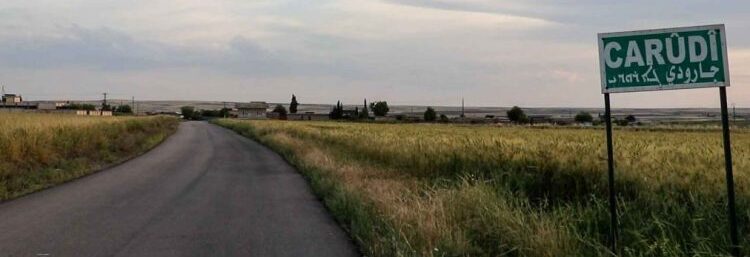QAMISHLI, Syria (North Press) – Jarudiye is a sparsely populated village on the Turkish-Iraqi-Syrian border triangle in the countryside of Derik, far northeastern Syria. Despite its small size, the residents have taken it upon themselves to manage the affairs of the village to achieve self-sufficiency and supports its development.
Through their own efforts, the villagers have set up a local economy, which includes various initiatives to generate income to be used according to the village’s needs.
The establishment of a public finance fund has provided a solid financial base for the village, enabling them to invest in various projects and infrastructure improvements.
This fund is managed by the local administration, ensuring that the money is used wisely and for the benefit of the entire village.
Joint efforts
In 2013, the residents of Jarudiye took an initiative and decided to build a garden in the middle of their village. This came at the beginning of the Syrian crisis when trees were indiscriminately cut down across the country due to shortage of fuel. At that time, trees were almost the only source of heating for the Syrian people.
Pine trees were planted in the shared garden, which covers an area of 10 dunams within the village. In 2015, the residents expanded the garden and built a fruit and vegetable orchard next to it.
Muhammad Suleiman Darwish, a resident of the village, told North Press that they worked together to provide services and meet the needs of the village.
About 45 families live in the village and they take turns in doing tasks in the garden, such as watering and cleaning.
Darwish added that they also built a hall to accommodate mourners during funerals in the case of death of someone in the village.
Self-sustaining economy
The garden plays a crucial role in providing both fruits and vegetables to the village residents as it is divided into two sections, one for planting fruit trees and the other for vegetables.
Darwish says that the production of fruits and vegetables such parsley, radish, and potatoes, are distributed among the village residents equally. The surplus is supplied to city markets, and the profits are deposited in the village finance fund.
The garden has a management system to organize irrigation, cleanliness, and monitoring to maintaining the garden’s functionality and health, Darwish adds.
Moreover, the villagers suffered from the deteriorating road leading to the village. They made repeated demands to repair the road, but the limited budget of the municipality hindered making any improvements.
In 2022, the villagers contributed 40 percent of the road repair cost to the municipality, which provided the machinery and workers. This way, they were able to overcome financial constraints and successfully enhance transportation accessibility.
Spring destination
During the spring season, Jarudiye is a popular destination for locals seeking to enjoy the natural beauty and tranquility of the countryside. The village is known for its lush greenery and its natural springs, which are said to contain pure and fresh water.
Nariman Hassan, a resident in Jarudiye, says the villagers collaborate every year to clean the springs.
The collaboration to clean the springs not only ensures that the water source remains clean and safe for consumption, but it also fosters a sense of unity and shared responsibility among the villagers.
The villagers take pride in taking care of their own resources and infrastructure, rather than relying on external assistance.
Hassan says that they do not ask or wait for help from anyone. She points out they meet the needs of their village through the combined efforts of expatriates and residents who showcase a close-knit bond within the community.
The villagers are dedicated to working together for the collective good of their community. They believe it is important to have self-sufficiency and mutual support in maintaining a sustainable and harmonious way of life.

